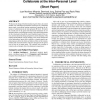623 search results - page 66 / 125 » The role of trust in distributed design |
WIAS
2008
13 years 7 months ago
2008
Our system, based on a multiagent framework called collaborative understanding of distributed knowledge (CUDK), is designed with the overall goal of balancing agents' conceptu...
ATAL
2008
Springer
13 years 9 months ago
2008
Springer
We discuss the design of the Intermediary Agent's brain, the control module of an embodied conversational virtual peer in a simulation game aimed at providing learning experi...
SIGCOMM
2010
ACM
13 years 8 months ago
2010
ACM
Capabilities provide an access control model that can be used to construct systems where safety of protection can be precisely determined. However, in order to be certain of the s...
DISCEX
2003
IEEE
14 years 1 months ago
2003
IEEE
The design principle of restricting local autonomy only where necessary for global robustness has led to a scalable Internet. Unfortunately, this scalability and capacity for dist...
KCAP
2005
ACM
14 years 1 months ago
2005
ACM
User-centered consultation systems can be viewed as systems with trust in the competence of the user, whereas conventional knowledge systems are often based on some mistrust. By o...

